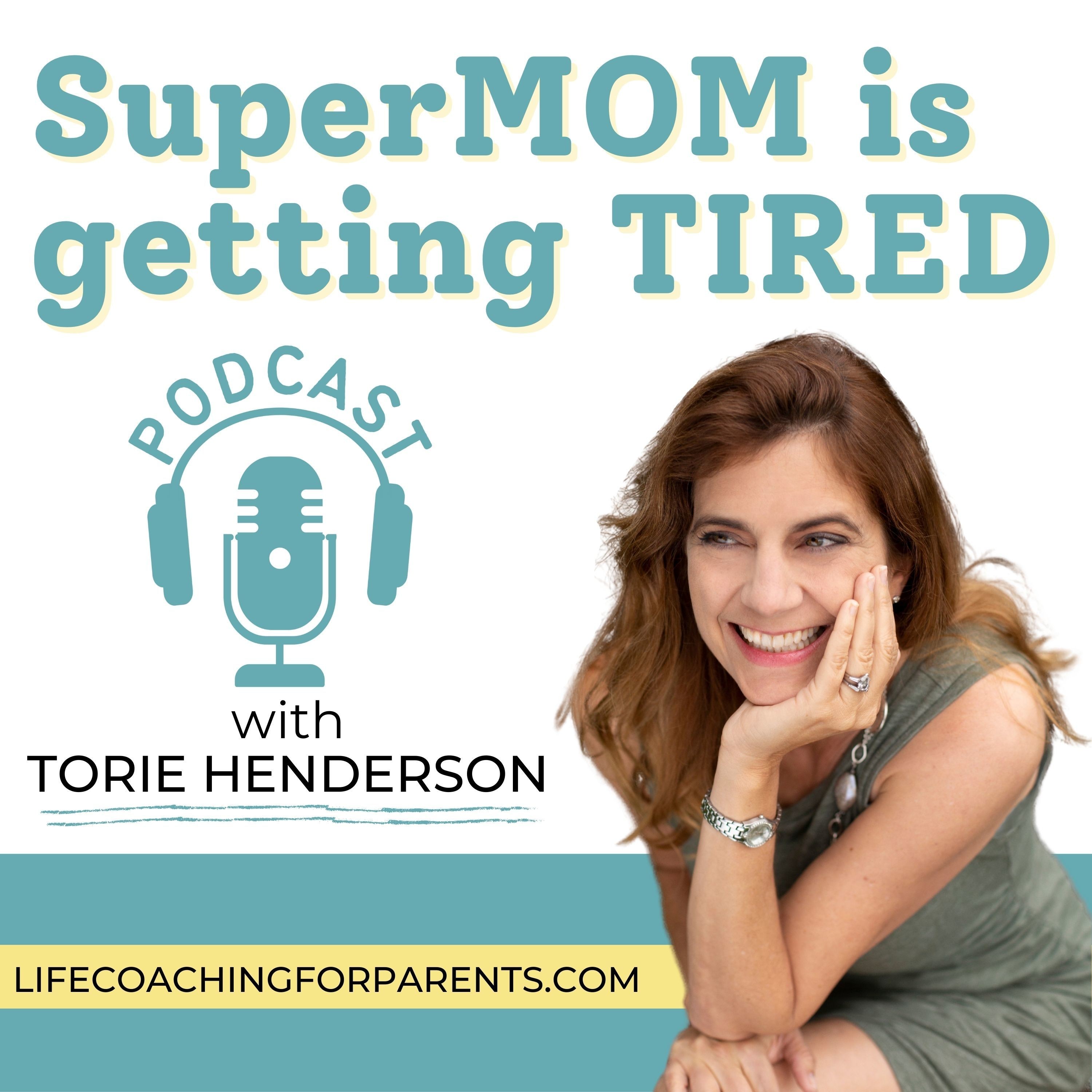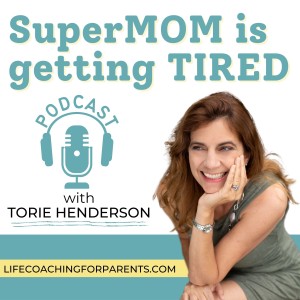
75K
Downloads
173
Episodes
You love being a mom but get overwhelmed, lost and resentful by all the parenting responsibilities. Listen as life coach, teacher and parent educator, Torie Henderson, answers common parenting dilemmas from hard working Supermoms. Are you exhausted from working hard all day but still feel like you haven’t accomplished anything? Do you want to feel calm, energized and in control? Then this podcast is for you.
Episodes

Tuesday May 18, 2021
Socially Uncomfortable Teen
Tuesday May 18, 2021
Tuesday May 18, 2021
Episode #99 - Socially Uncomfortable Teen
Question of The Day:
“I see my 15 year old being anxious anytime she has to interact with anyone in person! It’s as though she's lost her confidence to talk to someone face to face.”
“I have two teens, a 15 and a nineteen year old. One of the things that worries me is my 15 year old girl has become so introverted. She says she doesn’t like people and doesn’t want to be around people. With all this pandemic time at home and doing virtual school she really has become secluded. Her and I have a good relationship, but I know she needs others.” Cindy

Parent Educator Answer:
We just spent over a YEAR thinking that our friends can kill us. It is a very strange psychological trip to flip a switch and expect our kids to socially re-engage without struggle.
Avoiding social situations is a sure-fire way to increase social anxieties, especially during the teen and tween years where there is so much social nuance.
Let’s start by talking about the difference between introversion and social anxiety.
Introverts get drained by being around too many people, too much of the time. They need time alone to “power up” and fill their tank. Alone time gives introverts energy. Extroverts are energized by being with others. Too much time alone can drain an extrovert’s energy. They power up by being with people.
Introverts think before they speak where extroverts tend to think out loud. When introverts talk, they speak with fully formed thoughts and sentences.
Extroverts tend to have a “more is merrier” approach to people. They are often happy to open up to new people, where introverts tend to prefer deep friendships with a few core people.
When your daughter says she doesn’t like people that sounds more like social anxiety to me. It’s something she can say to protect herself from feeling awkward, embarrassed, or anxious. Easier to reject and say she doesn’t need it than to deal with those yucky emotions.
You can offer her books about introverts or watch TED Talks together about the subject, but the best way to help ALL kids who feel socially awkward (84% of middle schoolers btw) is to role-play social situations with them.
In the sex education class I teach for 9-12 year olds, I’ve done lots of role-playing with kids because they really like it. We’ll role-play peer pressure scenarios, sexual harassment scenarios, you name it. If you aren’t one for making up your own social scenarios, google social skills role-plays and you’ll find many created by teachers and counselors you can purchase or print off the internet.
Kids learn through play. When you present a scene and they get to play a character, it feels safe to try out different ways to respond. You plan and prepare for awkward, uncomfortable moments by rehearsing them first.
Taking a drama class is another way to help teens and tweens socialize. We tend to think of drama classes as being for outgoing, dramatic kids but they are great for quiet kids who struggle socially. When you are playing a role, you can try on different emotions and ways of acting and reacting without really having to put your whole self out there.
Another way to help build social skills is a game called Awkward Moment. Awkward Moment is a fun card game designed to teach social skills to kids. It’s similar to Apples to Apples, where everyone has 5 cards in their hand and chooses one of them to apply to the awkward situation. It exposes kids to awkward situations and shows them there are a variety of ways to respond. It’s geared towards kids more than teens, but it may be worth a try.
Your daughter can practice socializing in a non-intimidating environment by working with children, animals, or the elderly. She could volunteer or get a job with a training program that tells her how to act and what to say so it takes the pressure off trying to figure it out on her own.
There are many ways to help our socially awkward teens and tweens re-engage with society, once you open up to ideas.
Life Coaching Answer: What gets in our way from implementing them? Uncooperative children and no examples.
Chances are, unless you went to Cotillion dance lessons, you weren’t taught social skills in a formal way. It was probably something you just picked up. No one sat you down and role-played with you, teaching you what to say and how to make friends. When we don’t have any role modeling, it’s hard to figure out how to do it ourselves.
The other obstacle of course, is the eye rolling, and “OMG, MOM, NO!” that is bound to ensue when you approach the topic.

How do you get teens to cooperate with things that you know are good for them but they feel awkward doing?
- Make it fun- Have conviction
- Offer incentive
- Offer information, consequences, choice
- Make it about you.
- Make it normal - relate it to something else.
Supermom Kryptonite - “This is so easy”
When something comes easily to us, we have a hard time relating to our kids with compassion and empathy. Be wary of things that come easily to you, but not to your kids. Whether it’s socializing, math, athletics, or time-management, the thought “this is so easy” will drain your energy and get in the way of accomplishing your goals.
If social skills come easily to you, it might be difficult for you to break it down into small steps and teach it to someone else. Find someone for whom it did not come easily and who had to be taught it.
I really struggled socially and coped by not talking at all. I did everything I suggested above: drama classes, worked with children, had social jobs. I read teen novels like “The Popularity Plan” like they were self-help books.
If your kid is struggling with something you find easy, connect them with a tutor, a relative, a friend, a counselor, or anyone who had to learn it the hard way and can break it down into steps.
Tutor Bloom is an online resource that connects tutors and students. Because of the large number of post-pandemic kids struggling with social re-engagement, they are going to start offering social skills as one of their categories. Sign up to get connected at www.tutorbloom.com.
Supermom Power Boost - Love on the Spectrum
The BEST show I watched this year on Netflix was Love on the Spectrum. This Australian reality TV show teaches young adults with autism how to go about finding romantic relationships. They talk about how to find someone with common interests, to see that conversations are 50/50, to read people’s body language and expressions, and read the intentions behind people’s words. IT’S BRILLIANT! Everyone needs to watch this show, not just people on the spectrum. The rules for romance and dating have changed so much since John Hughes movies in the 80’s that all young people could benefit from having dating rules broken down so clearly. Not to mention the show is super entertaining and heart-warming!

No comments yet. Be the first to say something!